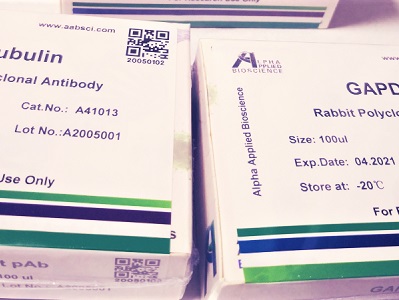

ATPK rabbit pAb
Cat :A11025
-
Source
Rabbit
-
Applications
IHC
-
Reactivity
Human, Mouse,Rat
-
Dilution
IHC 1:50-200
-
Storage
-20°C/1 year
-
Specificity
This antibody detects endogenous levels of ATPK at Human/Mouse/Rat
-
Source/Purification
The antibody was affinity-purified from rabbit serum by affinity-chromatography using specific immunogen.
-
Immunogen
Synthesized peptide derived from human ATPK
-
Uniprot No
P56134
-
Form
Liquid in PBS containing 50% glycerol, 0.5% BSA and 0.02% sodium azide.
-
Clonality
Polyclonal
-
Isotype
IgG
-
Background
Mitochondrial ATP synthase catalyzes ATP synthesis, utilizing an electrochemical gradient of protons across the inner membrane during oxidative phosphorylation. It is composed of two linked multi-subunit complexes: the soluble catalytic core, F1, and the membrane-spanning component, Fo, which comprises the proton channel. The catalytic portion of mitochondrial ATP synthase consists of five different subunits (alpha, beta, gamma, delta, and epsilon) assembled with a stoichiometry of 3 alpha, 3 beta, and single representatives of the gamma, delta, and epsilon subunits. The proton channel likely has nine subunits (a, b, c, d, e, f, g, F6 and 8). This gene encodes the f subunit of the Fo complex. Alternatively spliced transcript variants encoding different isoforms have been identified for this gene. This gene has multiple pseudogenes. Naturally occurring read-through transcription also exists between this gene and the downstream pentatricopeptide repeat domain 1 (PTCD1) gene. [provided by RefSeq, Nov 2010],
-
Other
ATP5J2 ATP5JL, ATPK
-
Mol.Wt (Da)
10340
-
Concentration
1 mg/ml
| Product | Reactivity | Applications | Conjugation | Catalog | Images |
|---|
-
 400-836-3211
400-836-3211
-
 support@aabsci.com
support@aabsci.com
-
β-actin rabbit pAb ...... >
-
β-actin rabbit pAb(A284) ...... >
-
Plant-actin rabbit pAb ...... >
-
β-tubulin mouse mAb(M7) ...... >
-
GAPDH mouse mAb(2B8) ...... >
-
GAPDH mouse mAb(PT0325) ...... >
-
Histone H3 rabbit pAb ...... >
-
Histone H3 rabbit pAb ...... >
-
COX IV mouse mAb(6C8) ...... >
-
GFP-Tag mouse mAb(1G6) ...... >
-
HA-Tag mouse mAb(1B10) ...... >
-
mCherry-Tag mouse mAb(6B3) ...... >










 400-836-3211
400-836-3211
